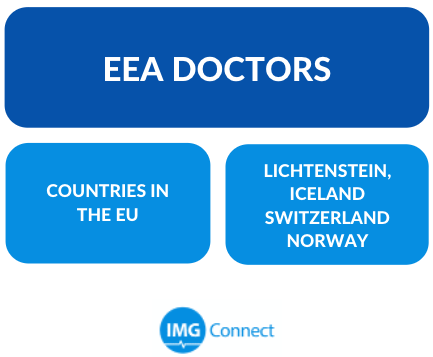Routes to GMC Registration – a comprehensive guide for IMGs
- April 06, 2023
For overseas doctors, there are several routes you can use to apply for GMC registration in the UK. The route that is right for you, depends on your qualification and experience.
GMC registration is essential for doctors practicing in the NHS, therefore it is important for overseas doctors to determine the most suitable route before securing a role.
This article will help you to identify the appropriate GMC application route for you as an IMG and will give you guidance on the steps you need to take, covering key areas including the following:
- What is the GMC?
- What do I need for GMC registration?
- Routes to GMC registration:
- #IMG Tips
- How do I get started?
Please skip ahead to the relevant section if you know what you’re looking for.
The General Medical Council
The GMC is the body in the UK which is responsible for licensing and revalidating every doctor. Therefore, for every doctor practicing in the UK, GMC registration is essential – you cannot practice in the UK without full GMC registration with a license to practise.
The primary responsibility of the General Medical Council is to ‘protect, promote and maintain the health and safety of the public’ in addition to improving medical education and practice across the UK.
Requirements for GMC Registration
Registering with the GMC is a multi-stage process, including key timings, actions and documents. For full GMC registration, international doctors must provide evidence of:
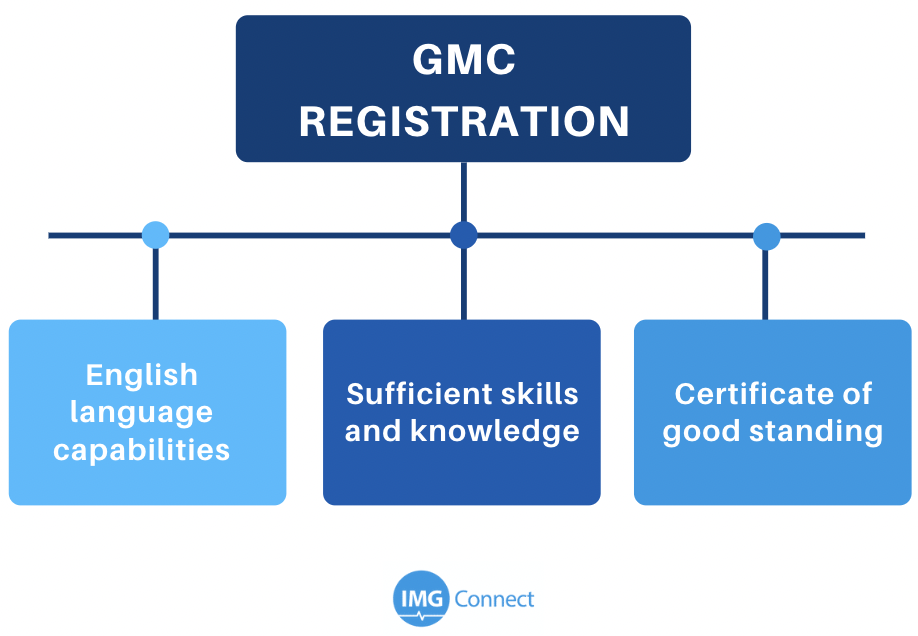
1. (EEA doctors) Sufficient skill and knowledge – as an EEA physician, this would be your recognised EEA qualification.
OR
1. (non-EEA doctors) Sufficient skill and knowledge – as a non-EEA physician, this would either be PLAB, your Royal College postgraduate qualification (e.g. MRCP) or a GMC-approved qualification.
AND
2. English language capabilities - either your IELTS, OET or an approved reference from your current employer (if you have been working in an English-speaking country for the last two years).
AND
3. Certificate of good standing – the certificate from your medical regulatory authority which demonstrates good standing.
There are several steps involved in the registration process, but these are the three main components required in order to be eligible.
To understand the registration process more fully, read our blog on GMC registration for overseas doctors here.
PLAB
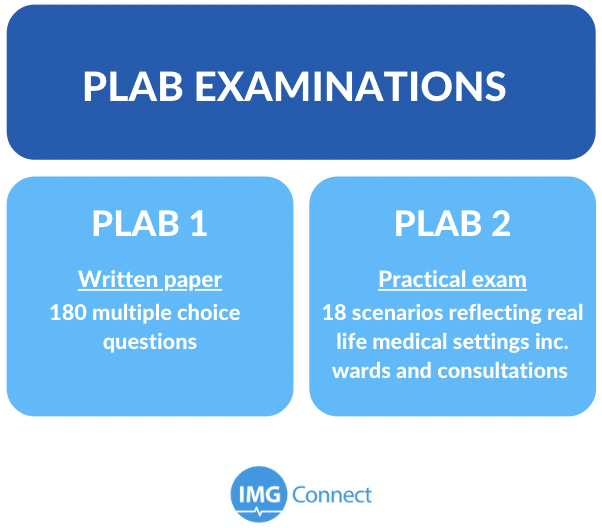
The PLAB exam is a two-part licensing exam that assesses a doctor’s ability to work safely as an SHO in the UK. As such, it does not demonstrate ability in any particular medical specialty.
For this reason, PLAB tends to be a route for junior doctors who have not already chosen their field of specialisation in medicine. That said, for some senior doctors PLAB can be an attractive option, offering a quicker route to the UK, whilst still securing competitive salaries.
If taking this option, doctors can then take up training or a more senior post once they have established themselves in the NHS. Take a look at our comprehensive guides on PLAB for more information.
Is PLAB suitable for me?
The PLAB route may be suitable for you if:
- You have not completed an internship, or your internship does not meet the acceptable pattern OR;
- You have completed an acceptable pattern of internship, but have no other clinical postgraduate experience OR;
- You are currently in or have completed postgraduate training (residency), and you want a faster route to full GMC registration.
Acceptable Postgraduate Qualifications or Licensing Exams
The GMC has produced a list of postgraduate qualifications which are accepted as sufficient evidence of the necessary knowledge, skills and experience required for full registration.
If these postgraduate qualifications are more than 3 years old when your application is made, you will have to provide further evidence of your recent medical experience.
UK Postgraduate Qualifications
Attaining a Royal College qualification is a preferred path for doctors who have already chosen their field of specialism i.e., pathology.
For senior doctors taking this route, they will gain access to more senior, well-paid jobs in the specialism of their choice.
For example, the Royal College of Physicians is the professional body that regulates all medicine specialties in the UK, and Membership of the Royal College of Physicians (MRCP UK) is the qualification attainable by examination. For overseas doctors, attaining full MRCP (UK) will satisfy the knowledge & skill criteria for GMC registration and facilitate application for more senior medicine roles in the UK.
Take a look at our complete guides on the Royal Colleges in the UK through our IMG Resources library to understand more.
The full list of UK postgraduate qualifications can be found here.
Overseas Postgraduate Qualifications
There are also some overseas qualifications that meet the same standards as UK postgraduate qualifications, although they are not necessarily the same in every aspect.
You can find the full list of UK and overseas qualifications here.
Licensing Exams
Doctors who have passed an acceptable overseas registration exam can apply for full GMC registration.
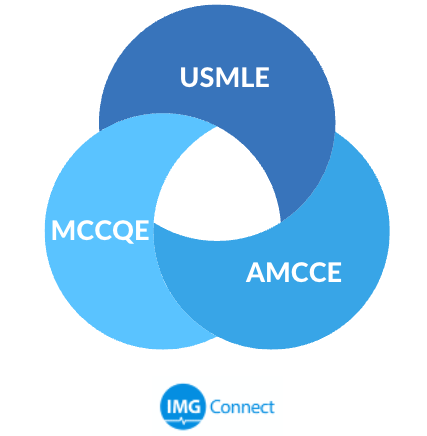
You are eligible for to apply via this route if you:
- graduated from a medical school outside the UK or Switzerland
and you:
- hold an acceptable primary medical qualification
- have completed an internship
- have passed one of the following overseas registration exams:
- United States Medical Licensing Exam (USMLE): Step 1, Step 2 clinical knowledge and Step 2 clinical skills; For Step 2 clinical skills, your pass must be between 16 April 2004 and 13 March 2020.
- Medical Council of Canada Qualification Examination 2 (taken in English) on or before 27 October 2020
- The Australian Medical Council Clinical Examination on or before 5 March 2020
- have passed each part of the exam including the knowledge tests and clinical skills components in four attempts or less. If you sat any part of the exam more than four times before passing, you will not be eligible for this application.
Is the postgraduate/ licensing exam route suitable for me?
The postgraduate route to GMC registration is a popular one and facilitates the attainment of more senior roles in the NHS than for example PLAB (when combined with the relevant experience).
If you have already completed an acceptable postgraduate qualification in your home country, this is the most suitable pathway for you, as you will not have to sit additional exams.
The same goes for acceptable licensing exams, which also exempts overseas physicians from PLAB.
If you have not passed an acceptable overseas postgraduate qualification or licensing exam, you would have to complete the relevant UK postgraduate qualification.
Relevant European Qualification
If you hold a medical qualification awarded in the EEA or Switzerland, it may be classed as a Relevant European Qualification (REQ). You can find out whether your qualification is classed as a REQ by selecting your country through this link. Each country’s page covers the qualifications you would need to send to the GMC to support your application for entry onto the Medical Register, GP and Specialist Registers, and where appropriate, provisional registration with a licence to practice.
Is the REQ route suitable for me?
The Relevant European Qualification route to GMC registration is suitable for you if you hold a specialist certification that is recognised by the GMC. You can verify this through your country’s GMC page here.
Sponsorship & MTI
Some institutions can provide sponsorship for GMC registration. Doctors who receive sponsorship are therefore exempted from PLAB or the need to have an acceptable postgraduate qualification or licensing exam.
MTI
The Medical Training Initiative (MTI) is a training programme that provides junior doctors from all over the world the opportunity to gain clinical training and development in the UK for a maximum of 24 months.
Although doctors practicing in the UK must be registered with the GMC, for MTI candidates, registration is typically supported by the Royal College, some NHS Trusts also have the right to register MTI doctors.
You can read more about the MTI scheme here.
Sponsorship
There are several types of sponsorship available to overseas doctors, such as sponsorship offered by NHS Trusts through International Fellowships or sponsorships for specific posts.
If you apply for GMC registration through sponsorship, you’ll have to satisfy the sponsor that you possess the knowledge, skills and experience required for practising as a fully registered medical practitioner in the UK.
Each sponsor may have their own scheme which has been pre-approved by the GMC, and since each scheme differs from the next, we advise that you check the sponsor’s official website and contact them for more information.
A key aspect of all sponsors' criteria is that a doctor applying for GMC sponsorship must have been engaged in medical practice for three out of the last five years including the most recent 12 months. It is important to meet these minimum criteria for the best chance of providing sufficient evidence to support your application.
The complete list of GMC-approved sponsors, including NHS Trusts and Royal Colleges, can be found here.
Is the sponsorship route suitable for me?
MTI is best suited to junior doctors and those who wish to return to their home country after the training period, whereas the criteria for other types of sponsorship can be more varied.
Specialist Registration
The Specialist Register is a register of doctors who can take up substantive consultant (permanent) posts in the UK. All doctors who wish to work as substantive consultant in the UK must show evidence of skills, knowledge, and experience in order to apply for Specialist Registration.
Specialist Registration is additional to full registration with the GMC. You can read more about the types of GMC registration here.
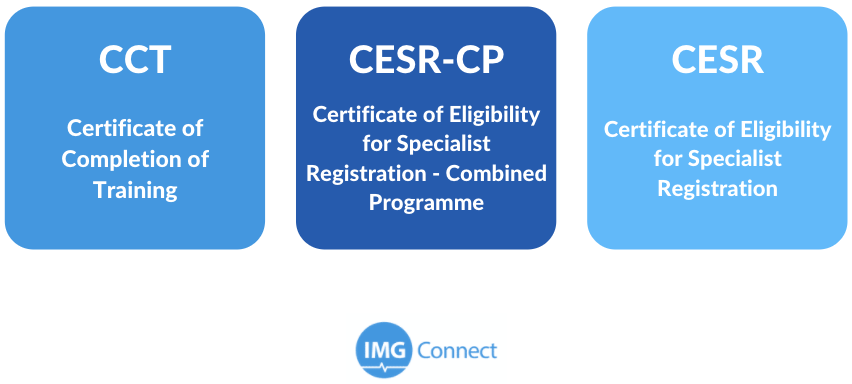
Doctors eligible for Specialist Registration apply directly to the GMC to demonstrate that their specialist training, qualifications, skills, knowledge and experience are equivalent to the requirements for CCT in the UK.
Doctors who have completed their specialist training in the EEA or Switzerland may be eligible for direct entry onto the Specialist Register through their Relevant European Qualification (REQ) and are awarded a CCT after a successful application.
CESR is the route to Specialist Registration for doctors who have not completed a GMC-approved specialty training programme i.e. doctors who have trained outside of the UK, Switzerland, and EEA countries. This is often the preferred route of IMGs.
For an in-depth guide to CESR, look at our blog for overseas doctors here.
Is Specialist Registration suitable for me?
Specialist Registration may be suitable for you if you (at minimum):
1. Hold a specialist qualification in the specialty you’re applying in
OR
2. Have at least six months of continuous specialist training in the specialty you’re applying in
You will have to provide evidence of your eligibility as part of your application, as well as evidence that you meet the requirements of the CCT curriculum in your specialty.
The indicative period of training to be awarded a CCT ranges from 5 years to 9 years in the UK (depending on the specialty), so if you have less training than this, it is unlikely that you will have the full evidence required for a successful application for Specialist Registration.
#IMG Tips
- In short, there are routes that depend on qualifications or exams from countries you’ve trained in: licensing exams, acceptable postgraduate qualifications, or REQs; or if you do not hold any of these: MTI, UK postgraduate exams or PLAB.
- Use the GMC route finder to double-check you are pursuing a route to registration that you are eligible for.
- If your route requires additional exams, begin your preparation for these well in advance and always start with the syllabus or curriculum for your exam!
- Read through the GMC’s page on required documents – the necessary documents can change, as the GMC adapts to changes in healthcare and current issues such as the COVID-19 pandemic.
- If you’ll be completing exams to register with the GMC, complete these or begin the process before you focus on English language testing – your IELTS or OET only have a 2-year validity period!
Getting started
So, there you have it, the main routes to GMC registration for IMGs. Once you have determined your route to GMC registration, it’s time to either begin gathering the required documents for your application or begin your preparation for any exams you’ll need to sit.
Have you already registered with the GMC, or looking to get started? Get in touch with us here to discuss finding an NHS post.
If you have any other questions, please feel free to get in touch with our team.
For advice, guidance and news and updates for IMGs, join the conversation through the links below.
